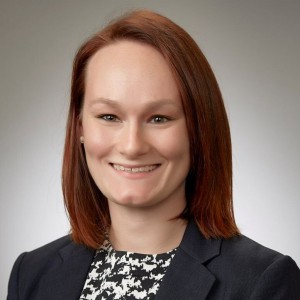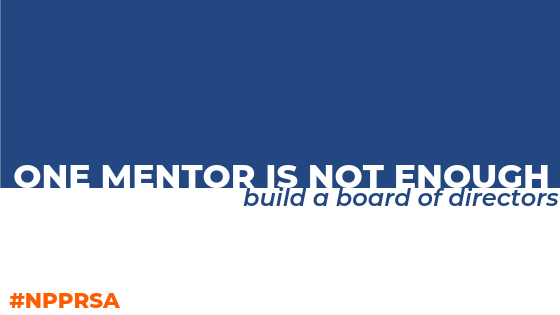There is no such thing as an ideal mentor.
That’s an idea it took me a long time to understand. Every person I had heard speak about mentoring spoke about their mentor as if he or she were a omniscient fairy godmother guiding them through life.
I tried finding that one person who would guide me through the ups and downs of my career, imagining teachers and professionals I admired as that go-to person, trying out formal mentoring programs to no avail.
Then I heard a take on mentoring that completely changed the way I looked at it – the idea that everyone should have their own personal board of directors filling that role of mentor and advisor.
It took a while for the ideas to stick, but when it did, it made so much sense. I don’t depend on just one person for advice in any other area of my life, why would I expect one person fill that need professionally?
Like an organization needs a board full of people from different backgrounds with varied experiences and perspectives, so too do professionals. No lone person will have had the same exact experiences you will, so having a pool of trusted advisors will help you grow and develop in a variety of situations.
For your board of directors to be effective, your group needs to be varied. Having two people whose careers and lives mirror each other won’t necessarily be the most helpful to your development. Look for people in your life and your network who fill roles like:
- Someone who’s career you admire
- Someone who’s experience is similar to yours
- Someone who is in your field, industry or niche
- Someone who is not in your field, industry or niche
- Someone who is at your experience level
- Someone just a couple steps ahead of you experience-wise
- Someone with a lot of experience
- Someone who will help connect you to others to grow your own network
You don’t need to fill out your board of directors all at once – that will happen over time. You do need to make sure there is variety in who you’re approaching for advice, though. It may seem like quite an undertaking to find people, but I’m sure if you take a good look at your own network, your board of directors will begin to take shape.
Looking amongst your own circles makes a lot of sense when you think about it. For a mentorship to be successful, there needs to be trust, common values and common interests. A mentor needs to be someone you respect and with whom you mesh, so looking to people you already have a connection with is a great place to start.
If you feel there’s little variety in your network, try casting your net just a bit wider to your PRSA chapter, your alma mater’s alumni network and your network’s network. Asking to connect with strangers becomes a bit easier when you already know you have something in common.
One-on-one coaching like a traditional mentoring relationship may work for some, but it’s not the only way. Like any other relationship, a mentorship should grow and change over time. Being mentored is an ongoing process, not an accomplishment or item to check off along your career path. It’s something that takes work, time and dedication. And much like other things in your life – your relationships, your professional development, your own well-being – you get out of it exactly what you put into it.
Looking to learn more about building a successful mentoring relationship? Join us as we partner with the College of Fellows for Supercharge your career: How finding or being a mentor can transform your professional development, a webinar to discuss the ins and outs of mentoring. Register now.
(P.S. The first draft of this post contained an ode to my own personal board of directors – a zany group of professionals who have helped guide me through my career. While everyone should have their own board of directors, no two groups will ever be identical and I think it’s important for everyone to find what works for them. They know who they are and know how deeply I value them. However, the story of how our paths have crossed is one I’m always happy to tell to anyone who asks.)
 In her fourth year on PRSA’s New Professionals Section’s executive committee, Robyn serves as 2019 chair. She’s a native of southern New Jersey and currently resides in Washington, D.C., by way of Pittsburgh and South Carolina. Robyn currently works for Airports Council International – North America (ACI-NA), a trade association representing North America’s airports, and holds a bachelor’s degree in Public Relations and a master’s degree in media arts and technology, with a focus on creative media practices, both from Duquesne University. She likes to spend her spare time cooking, reading, exploring, crocheting and spending time with her tail-less cat, Izzy. Learn more about her on her website or find her on Twitter & talk to her!
In her fourth year on PRSA’s New Professionals Section’s executive committee, Robyn serves as 2019 chair. She’s a native of southern New Jersey and currently resides in Washington, D.C., by way of Pittsburgh and South Carolina. Robyn currently works for Airports Council International – North America (ACI-NA), a trade association representing North America’s airports, and holds a bachelor’s degree in Public Relations and a master’s degree in media arts and technology, with a focus on creative media practices, both from Duquesne University. She likes to spend her spare time cooking, reading, exploring, crocheting and spending time with her tail-less cat, Izzy. Learn more about her on her website or find her on Twitter & talk to her!

